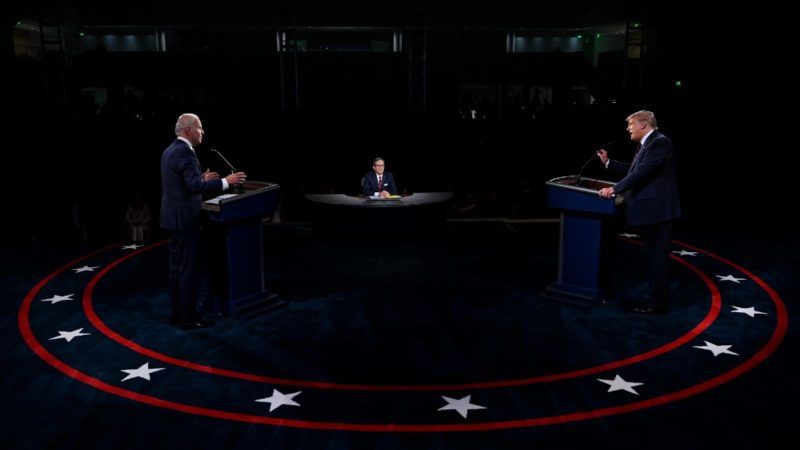The Foreign Policy Questions Trump and Biden Should Answer
American voters deserve careful scrutiny of the candidates' positions on individual conflicts.

The topic list for the final presidential debate this Thursday—assuming it happens—is broad. In just an hour and a half, President Trump and Democratic nominee Joe Biden will be asked to address the COVID-19 pandemic, American families, race, climate change, leadership, and national security.
These are all worthwhile topics, but the latter is uniquely important for this office. The president does not have the Constitutional power to start new wars, whatever recent practice may suggest, but he does have the power to end them, and our country has a lot of wars overdue for conclusion. American voters deserve careful scrutiny of the candidates' positions on individual conflicts and larger strategic matters alike. Here are a few questions Trump and Biden should answer.
Afghanistan. This is the longest war and nation-building project in American history, and you have both pledged to end it. President Trump, you've backtracked on exit plans before and don't intend to withdraw the last ground troops before Inauguration Day. What is your purpose in this delay, and what will you do if that purpose is not achieved by next summer's withdrawal deadline? Vice President Biden, what is the meaningful difference between your Afghanistan policy and your opponent's? Will you end this war within six months of your inauguration?
Iraq. After initially supporting the 2003 invasion, you have both more recently called the war in Iraq a mistake. The American public agrees: Two thirds say the war wasn't worth fighting, and the Army's history of Iraq describes a "doomed" venture in which the United States failed "to attain its strategic objectives" and instead produced regional destabilization, hundreds of thousands of American and Iraqi casualties, and up to $2 trillion debt-funded spending. What lesson(s) do you see here? Do you anticipate ending this war within four years if you win this election? If not, why not?
Yemen. The Obama administration began supporting the Saudi-led coalition intervention into Yemen's civil war in 2015, and the Trump administration has continued to enable coalition actions that have been widely labeled war crimes. Vice President Biden, when did you first oppose the U.S. role in Yemen, and what is your schedule for ending it? President Trump, you vetoed a bipartisan bill with strong public support that would have required U.S. departure. Under what circumstances, if any, would you change your mind on this issue?
North Korea. U.S. diplomacy with North Korea is at a standstill and has seen little real progress since the first summit with leader Kim Jong-un in 2018. Washington continues to insist on complete, verifiable, irreversible denuclearization (CVID) as the only acceptable goal in negotiations despite strong evidence this is not an aim Pyongyang will accept so long as it believes forcible, U.S.-orchestrated regime change—like in Iraq—is a risk. To both candidates: Will you continue indefinitely to insist on CVID in your talks with North Korea? Will you pursue a peace treaty for the Korean War?
Iran. Our relationship with Iran is at a five-year low since the Trump administration left the Iran nuclear deal and instituted its counterproductive "maximum pressure" approach, which demands Tehran concede everything in exchange for nothing before negotiations even begin. Vice President Biden, you've said you'd rejoin the deal but intend to continue sanctioning Iran. How will your Iran policy progress beyond that of the Obama administration, which contributed to cruel shortages of food and medicine for ordinary Iranians? President Trump, you've said we'll have a new nuclear deal with Iran "within one month" if you're re-elected. What will you do if we don't? How will you avoid repeating the needlessly dangerous position in which you put us this past January?
Great power competition. How would you characterize U.S. relations with China and Russia? In what circumstances would you risk war with these fellow nuclear powers? How aggressively would you deploy U.S. troops near their borders, as in the South China Sea, or in nations where they have a ground presence, like Syria? Would you intervene militarily to fight against Russia in Eastern Europe or to protect Taiwan from invasion by Beijing? If yes, please explain the necessity of that choice to defend U.S. national security.
Grand strategy. How would you describe your grand strategy for U.S. foreign policy? What do you consider vital U.S. security interests—interests that require military defense because our country cannot survive without them? The U.S. keeps around 150,000 troops at 800 bases in 70 nations worldwide. Do you believe that global sprawl is necessary for U.S. security? What is your method of diplomacy, and how do you conceive its place within your strategy for foreign affairs? Why are you best suited to steward the United States toward safety and peace?


Show Comments (54)